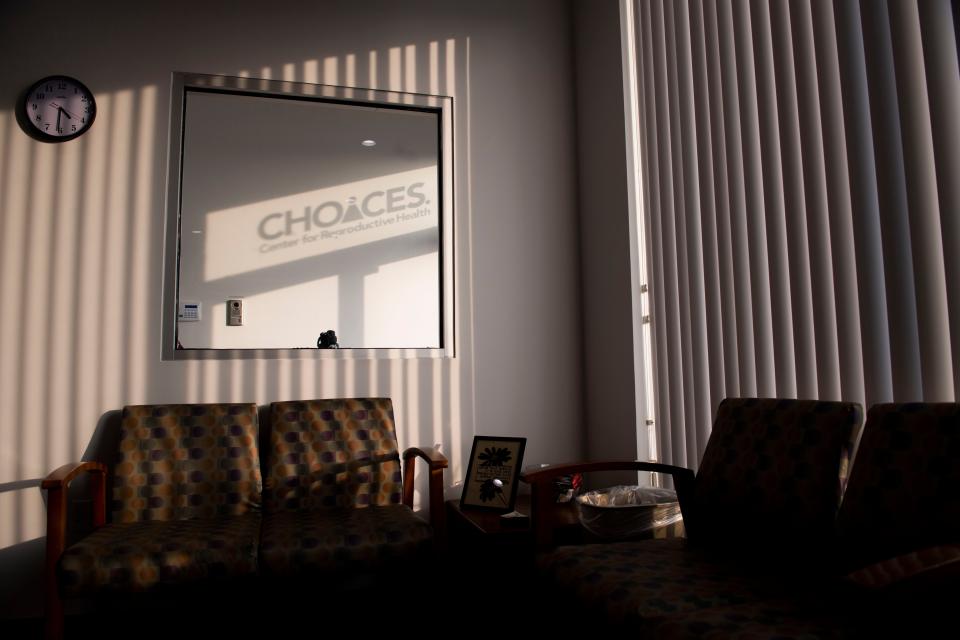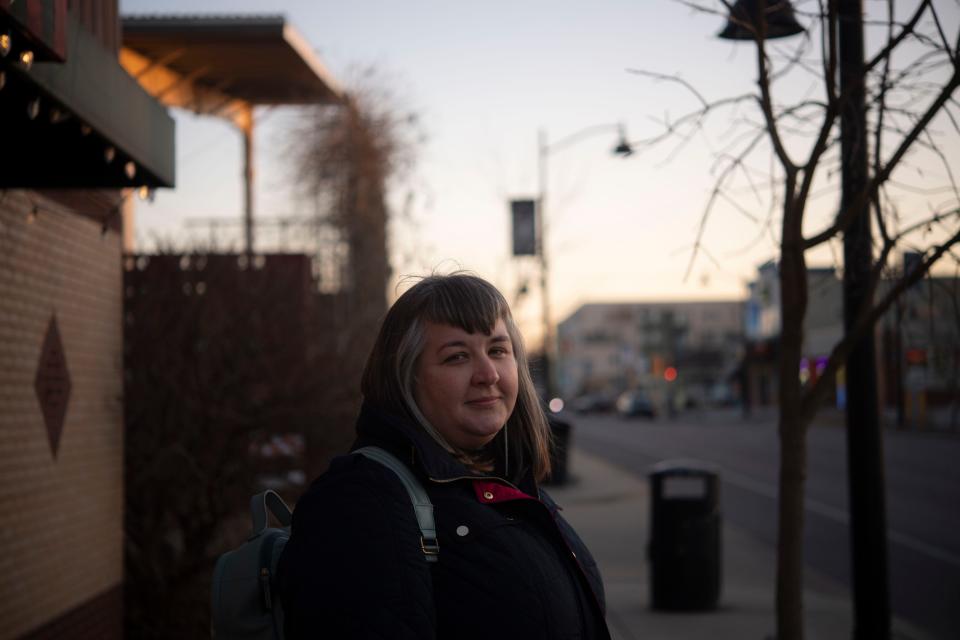'Making these decisions is so different than the politics'
She had already traversed from Tennessee to Illinois before she made what felt like another long journey: walking past anti-abortion protestors to the front door of the clinic for her appointment. As she passed people donning orange vests and waving anti-abortion brochures, she felt they didn't understand her. She already had two kids. She had lost her job. She wasn't with her partner. It wasn't the right moment for her to have a child, but it didn't make the choice any easier.
“This abortion has been such a tremendously difficult decision to make. And on top of that, to have to spend money and travel, find somebody to watch my kids, ask somebody for a car …” she said. “Regardless of whether it hurts or not, this is the best decision for me.”
The difficulty of this woman's situation struck USA TODAY national correspondent Chris Kenning when he spoke with her in December at Choices Center for Reproductive Health in Carbondale, Illinois.
"Making these decisions felt so different than the politics. They're complex and personal," he said.
👋 Hi there, I'm Nicole Fallert, author of Your Week, a column just for USA TODAY subscribers like you. This week I talked to Kenning about his reporting on Carbondale, a rural town thrust into the epicenter of the nation's ever-changing abortion landscape.
But first, don't miss these stories made possible by your USA TODAY subscription (and keep scrolling for more reads!):
Donald Trump was indicted over classified documents. Why aren't Joe Biden and Mike Pence?
The LIV Golf-PGA Tour merger could signal a large Saudi presence in American sports.
The Class of 2023 lost everything to COVID. Then they fought back.
Opinion: Debt ceiling deal reveals the impotence of Trump's MAGA movement.
Yellowstone issues plea after multiple incidents of tourists disturbing wildlife: ‘Leave it alone.'
'A story emblematic of these new fault lines'
Nearly one year ago, the Supreme Court struck down Roe v. Wade, ending the constitutional right to abortion. Kenning and his editor immediately asked a question: "If the right to an abortion was now up to the states to determine, what challenges would abortion providers face as some began moving to less restrictive states to keep serving clients?"
Kenning heard some providers were planning to open clinics in Carbondale, a small college town that sits on the map among states that have either banned or curbed abortion access since June 2022. The city has long been a blue-dot town amid deep-red farm country. But it had never planned on being the center of anybody’s abortion fight. That is until the Supreme Court's decision thrust patients all over the country into uncertainty. Where could they travel from restricted states in the South and Midwest for care?
Carbondale became the unlikely answer, and the city's story is "emblematic of these new fault lines," Kenning told me this week, describing Carbondale's places and people as an "interesting window" into how state lines have come to determine abortion access in this new era.

The city wasn't known for reproductive rights before now. Elective abortion care had basically ceased in Carbondale since the 1980s when opponents had persuaded the local hospital to halt them. But post-Roe, Kenning watched the town become the closest abortion destination for more than a million people from states as far as Louisiana.
"We wanted to see what would roll out over time," Kenning said. "One of the things that we tried to do was focus more on the place."
Over the past year, Kenning frequently traveled to Carbondale to speak with providers, patients and opponents in the town. He developed relationships with residents to humanize the headlines about the legal cases and policies state legislatures have relentlessly pursued in recent months to either curb or protect abortion.
Kenning spoke with Jennifer Pepper, president and CEO of Choices Center for Reproductive Health, who had been eyeing Carbondale even before the Court's ruling. While the surge of patients took some time to build, the steadily increasing numbers in recent months proved her intuition about the town was correct.
"(Abortion providers) were really right in realizing how strategic this place would be," Kenning said.
He was also surprised to find the fiery opposition at city council meetings to the clinic's pending arrival in Carbondale didn’t translate into the permanent tensions that some city leaders feared. While some clinic workers initially worried they might face backlash in the small town, Kenning witnessed mostly the opposite, saying the clinic workers have received an unexpected amount of support from the town.

Kenning says one of his most memorable interviews was with the woman from Tennessee who struggled with her decision. He said that speaking to patients like her demonstrated the nuance of the issue: "It really struck me the decision is not a calculus."
Since last year, I've followed one Southern Illinois town, where abortions hadn't been provided in decades. In the year since Roe fell, the small town has transformed into the closest place for an abortion for 1.2 million people. Here's its story. https://t.co/tDgxVhamN8
— Chris Kenning (@chris_kenning) June 7, 2023
Working on a story over many months is a completely different approach to covering abortion in our nation than just keeping pace with the rapidly-changing laws, Kenning said. He found the opportunity to report deeply over time to be incredibly rewarding and emblematic of the attention USA TODAY pays to people-first narratives. He is grateful this project allowed him to capture such a dynamic account of the reality these communities face.
"Doing a story to this level of detail and nuance also helped uncover a lot of new aspects to the issue that I hope to explore further," Kenning said.
Thank you
Over time, Kenning explored every facet of how changing abortion rights were altering a place and its people. People outside of Carbondale helped provide transportation. Inside town, they debated whether city ordinances should shield the clinics from protests. I hope you find this exploration interesting. It certainly opened my mind to new ideas and inspired further questions.
The work of reporters like Kenning makes a huge impact on our readers and their communities. Thank you for supporting our journalism with your subscription. Our work wouldn't be possible without you.
Best wishes,
Nicole Fallert
This article originally appeared on USA TODAY: Daily Briefing: 'Making these decisions is so different than the politics'

